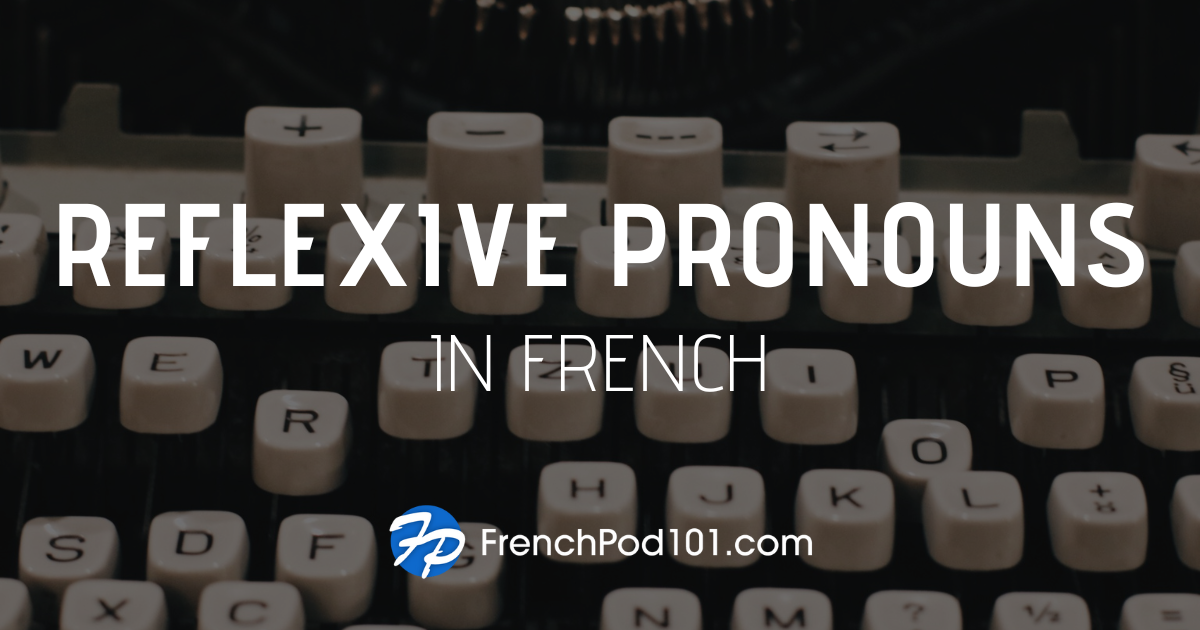
Could you imagine a novel written without any adverbs? It would feel terribly bland and boring, devoid of flavor and lacking substance. You wouldn’t have characters walking awkwardly or talking softly; they couldn’t stare suspiciously or ambiguously. They could only gaze upon the world with flat eyes.
Luckily, writers as well as speakers have a wide collection of adverbs at their disposal to spice things up. French adverbs describe where, when, how, and much more. They can express the feelings and perspective of the speaker and make any description tremendously more lively and colorful, just like adjectives do in their own way—starting with this very sentence!
French adverbs are not particularly tricky, but they still hold a few secrets which we’ll unfold together. In this article, we’ll cover French adverb placement, their formation, and most importantly, we’ll give you an extensive list of the 100 most useful French adverbs to know.
 Table of Contents
Table of Contents
- French Adverbs User Manual
- The 100 Most Useful French Adverbs
- How FrenchPod101 Can Help You Learn More French

Can you feel the magic of adverbs washing over you?
1. French Adverbs User Manual
1 – What are they?
Adverbs are a type of word that works together with a verb, an adjective, or another adverb to change its meaning or make it more precise. Basically, they describe verbs, adjectives, or fellow adverbs.
Here are some examples of French adverbs:
- Doucement (“Softly”)
- Sérieusement (“Seriously”)
- Furieusement (“Furiously”)
And here’s how they combine with the verb parler (“to speak”):
- Je parle doucement. (“I speak softly.”)
- Je parle sérieusement. (“I speak seriously.”)
- Je parle furieusement. (“I speak furiously.”)
With just one word, you completely change the tone of the sentence and create a whole different mood.
2 – What are they made of?
In French, just like in English, adverbs are often based on adjectives. More specifically, they’re based on the feminine form of the adjective.
Do you remember how French adjectives have masculine and feminine forms? If not, be sure to check our previous article on the 100 Must-Know French Adjectives!
Here’s an example of the masculine vs. feminine forms of French adjectives:
- Doux / Douce (“soft”)
- Sérieux / Sérieuse (“serious”)
Now, here’s how to go about forming French adverbs from adjectives:
Feminine adjective + ment = Adverb
- Douce (“Soft”) >> Doucement (“Softly”)
- Sérieuse (“Serious”) >> Sérieusement (“Seriously”)
- Rapide (“Quick”) >> Rapidement (“Quickly”)
Then, like in English, there are a few exceptions to this rule.
| Adjectives ending with -i are formed like this: Masculine adjective + ment = Adverb
|
| Adjectives ending with -ent or -ant are formed with: Masculine adjective – nt + mment = Adverb
|
And of course, there are the rebellious ones that don’t follow any rules:
- Bon (“Good”) >> Bien (“Well”)
- Mauvais (“Bad”) >> Mal (“Badly”)
Finally, many common adverbs in French are not created from adjectives. You’ll find plenty of them in our list.

What are these mysterious adverbs? Let’s find out!
3 – Where do they live?
Now, where do adverbs go in French sentences? Luckily, this is very similar to English.
When adverbs modify verbs, they usually come AFTER the verb.
- Je parle doucement. (“I speak softly.”)
- Elle mange lentement. (“She eats slowly.”)
- Nous travaillons sérieusement. (“We work seriously.”)
When adverbs modify adjectives or adverbs, they come AFTER the verb and BEFORE the adjective / adverb.
- C’est vraiment bien. (“It’s really good.”)
- Il est souvent absent. (“He’s often absent.”)
- Ils sont plutôt intelligents. (“They are rather intelligent.”)
- →Make sure to visit our vocabulary list on the Must-Know Adverbs to Connect Your Thoughts, with audio recordings to practice your pronunciation. It’s freely available on FrenchPod101.com.

2. The 100 Most Useful French Adverbs
1. French Adverbs of Time (When?)
1
| Tard “Late” | C’est trop tard. “It is too late.” |
2
| Tôt “Early” | Je me lève tôt. “I wake up early.” |
3
| Bientôt “Soon” | Nous arriverons bientôt. “We will arrive soon.” |
| Bientôt literally means “Well early.” | |
4
| Déjà “Already” | Tu as déjà mangé ? “Have you eaten already?” |
5
| Hier “Yesterday” | Je ne l’ai pas vu depuis hier. “I haven’t seen him since yesterday.” |
6
| Aujourd’hui “Today” | Il fait beau aujourd’hui. “It’s sunny today.” |
| Why is this word so weird? It has a long and interesting story, but to keep it short: Au + jour + de + hui, literally means “on the day of today.” Hui isn’t used anymore and originally comes from the Latin word hodie. | |
7
| Demain “Tomorrow” | Il va pleuvoir demain. “It’s going to rain tomorrow.” |
8
| Longtemps “A long time,” “Long” | Ça ne prendra pas longtemps. “It won’t take long.” |
| Longtemps is simply the combination of long (“long”) + temps (“time”). | |
9
| Longuement “At length” | Ils en ont parlé longuement. “They talked about it at length.” |
10
| Brièvement “Briefly” | Je vais expliquer brièvement les règles. “I will briefly explain the rules.” |
11
| Maintenant “Now” | Nous partons maintenant. “We leave now.” |
12
| Avant “Before” | C’était mieux avant. “It was better before.” |
13
| Après “After” | J’irai après le travail. “I will go after work.” |
14
| Encore “Again,” “Still” | Ils reviendront encore et encore. “They will come back again and again.” Elle vit encore à cette adresse ? “She still lives at this address?” |
15
| Enfin “At last” | J’ai enfin terminé ! “I’ve finished at last!” |
16
| Ensuite “Then” | On va ensuite le mettre au four. “Then, we’re going to put it in the oven.” |
| Another quick tip for this one: une suite means “sequel” or “follow-up.” | |
17
| Précédemment “Previously” | Revenons sur les problèmes mentionnés précédemment. “Let’s go back to the previously mentioned issues.” |
18
| Actuellement “Currently” | Vous ne pouvez actuellement pas acheter ce produit. “You can’t currently buy this product.” |
| This is what we call a “false friend.” Although it looks like the English word “actually,” it has a different meaning. “Actually” would translate to en fait. To make things even more confusing, “currently” comes from the same root as couramment which has yet a different meaning (“commonly”). I think I need an Aspirin! | |
19
| Dernièrement “Lately” | Je fume beaucoup dernièrement. “I smoke a lot, lately.” |
| Dernièrement comes from the word dernier (“last”) but it doesn’t mean “lastly.” This would be enfin or finalement. | |
20
| Soudain “Suddenly” | Il a soudain arrêté de fumer. “He has suddenly stopped smoking.” |
21
| Alors “Then” | Il a alors commencé à boire. “He then started drinking.” |

J’ai enfin terminé ! (“I have finished, at last!”)
2. French Adverbs of Frequency (How Often?)
22
| Jamais “Never” | Je n’oublierai jamais. “I will never forget.” |
23
| Parfois “Sometimes” | Elle mange parfois dehors. “She sometimes eats outside.” |
24
| Rarement “Rarely” | Je vais rarement au cinéma. “I rarely go to the cinema.” |
25
| Trop “Too much” | J’ai trop mangé… “I’ve eaten too much…” |
| It’s also very common to use trop with the meaning of “so,” either in a positive or negative context: C’est trop bien ! (“It’s so good!”) C’est trop chiant… (“It’s so annoying…”) | |
26
| Souvent “Often” | Tu fais souvent la fête ! “You often have parties!” |
27
| Habituellement “Usually” | Il se couche habituellement vers minuit. “He usually goes to bed around midnight.” |
| Habituellement comes from une habitude (“a habit”), and describes something that happens routinely. We use it almost like “usually” for anything that keeps repeating until it becomes predictable. | |
28
| Généralement “Generally,” “Usually” | Ils commencent généralement à l’heure. “They usually start on time.” |
29
| Couramment “Commonly,” “Fluently” | C’est l’option la plus couramment utilisée. “This is the most commonly used option.” Vous parlez couramment Allemand. “You speak German fluently.” |
30
| Toujours “Always” | Je t’aimerai toujours. “I will always love you.” |
31
| Tout le temps “All the time” | Elle a tout le temps faim en ce moment. “She’s always hungry lately.” |
32
| Quotidiennement “Daily” | Il s’entraîne quotidiennement. “He’s training daily.” |
33
| Mensuellement “Monthly” | Vous serez prélevé mensuellement. “You will be charged monthly.” |
34
| Fréquemment “Frequently” | J’ai fréquemment envie d’un gros kebab. “I frequently want a big kebab.” |
35
| Peut-être “Maybe” | Elle viendra peut-être ce soir. “Maybe she’ll come tonight.” |
| This weird contraption is the combination of peut (from the verb pouvoir, meaning “can”) and the verb être (“to be”). It literally means “can be” or “may be.” Quite fitting, right? | |
36
| Aussi “As well,” “Too,” “Also” | Tu veux venir aussi ? “Do you also want to come?” |
37
| Egalement “As well,” “Too,” “Also” | Tu viendras également ? “Will you come as well?” |
| This is a slightly more sophisticated version of aussi, but they have the same meaning, really. | |
38
| Même “Same” | On a tous les deux la même coiffure. “We both have the same haircut.” |

Il s’entraîne quotidiennement. (“He trains daily.”)
3. French Adverbs of Place (Where?)
39
| Ici “Here” | Tu viens souvent ici ? “Do you come here often?” |
40
| Là “There” | Tu peux le mettre là. “You can put it there.” |
41
| Partout “Everywhere” | Je veux voyager partout ! “I want to travel everywhere!” |
42
| Nulle part “Nowhere” | Ce chemin ne mène nulle part. “This road is going nowhere.” |
43
| Quelque part “Somewhere” | Si on continue de marcher, on arrivera quelque part. “If we keep walking, we’ll end up somewhere.” |
44
| Ailleurs “Somewhere else” | Si on ne peut pas rester ici, on ira ailleurs. “If we can’t stay here, we’ll go somewhere else.” |
45
| Dedans “Inside” | Tu vois ce qu’il y a dedans ? “Do you see what’s inside?” |
46
| Dehors “Outside” | Les enfants sont allés jouer dehors. “The kids have gone outside to play.” |
47
| En haut “Up,” “Above” | Elle a marché tout en haut de la montagne. “She walked all the way up the mountain.” |
48
| En bas “Down,” “Below” | Elle est revenue en bas pour camper. “We went back down to camp.” |
49
| Dessus “Over,” “On” | Les ingrédients sont écrits dessus. “The ingredients are written on it.” |
50
| Dessous “Under,” “Below” | Il est enterré en dessous de ce rocher. “It is buried under this rock.” |
51
| Loin “Far” | Nous avons marché plus loin que prévu. “We have walked farther than planned.” |
52
| Près “Close” | Le prochain camp est près du sommet. “The next camp is close to the summit.” |
53
| Autour “Around,” “Round” | Asseyez-vous autour du feu. “Gather round the fire.” |
54
| Là-bas “Over there” | Nous y arriverons avant midi. “We will get there before noon.” |

Ils marchent loin. (“They walk far.”)
4. French Adverbs of Manner (How?)
55
| Bien “Well” | On mange bien ici ! “We eat well here!” |
56
| Mal “Badly,” “Poorly” | Ce texte est mal traduit. “This text is poorly translated.” |
57
| Doucement “Softly,” “Quietly” | Parlez doucement, les enfants sont couchés. “Speak softly, the kids are sleeping.” |
58
| Lentement “Slowly” | Je pédale lentement car je suis fatigué. “I pedal slowly because I’m tired.” |
59
| Vite “Quickly” | Je pédale plus vite quand je suis en forme. “I pedal faster when I’m in good shape.” |
60
| Rapidement “Fast,” “Quickly,” “Shortly” | Dis moi si je parle trop rapidement. “Tell me if I speak too fast.” |
61
| Calmement “Calmly,” “Quietly” | J’attends calmement mon tour. “I quietly wait for my turn.” |
62
| Joyeusement “Joyfully,” “Happily” | Elle souriait joyeusement. “She was smiling joyfully.” |
63
| Facilement “Easily” | Tu apprends facilement de nouvelles langues. “You easily learn new languages.” |
64
| Litttéralement “Literally” | Il y a littéralement des centaines d’adverbes ! “There are literally hundreds of adverbs!” |
65
| Simplement “Simply,” “Just” | Tu peux simplement le démonter avec cet outil. “You can simply disassemble it with this tool.” Je veux simplement t’aider. “I just want to help you.” |
66
| Gentiment “Gently” | Demande-moi gentiment. “Ask me nicely (gently).” |
67
| Heureusement “Luckily” | Heureusement, l’histoire se termine bien. “Luckily, the story ends well.” |
| Beware of another false friend! Heureusement comes from heureux (“happy”), but it doesn’t mean “happily.” This would be joyeusement or volontiers. | |
68
| Poliment “Politely” | On lui a demandé poliment de partir. “We politely asked him to leave.” |
69
| Brusquement “Suddenly” | Le sentier s’arrête brusquement. “The trail suddenly stops.” |
70
| Naturellement “Naturally” | Nous cherchons naturellement un autre chemin. “We naturally look for another way.” |
71
| Précisemment “Precisely” | Nous marchions depuis précisément une heure. “We were walking for precisely one hour.” |
72
| Parfaitement “Perfectly” | Je savais parfaitement où nous allions. “I knew perfectly well where we were heading.” |
73
| Sérieusement “Seriously” | Nous pensons sérieusement à revenir sur nos pas. “We’re seriously considering backtracking.” |
74
| Ainsi “As well as,” “Thus,” ? | On pourrait ainsi trouver notre chemin. “It would allow us to find our way.” |
| This one is tough to translate. It often means “as a result,” but in a more subtle way… So subtle that it could often be omitted in most translations. | |

Je m’excuse poliment. (“I politely apologize.”)
5. French Adverbs of Quantity and Degree (How Much? To What Extent?)
75
| Vraiment “Truly,” “Really” | J’ai vraiment faim ! “I’m really hungry!” |
76
| Plutôt “Rather” | Tu ne veux pas plutôt reprendre un verre ? “Won’t you rather have another drink?” |
77
| Assez “Enough” | Tu ne crois pas que tu as assez bu ? “Don’t you think you’ve been drinking enough?” |
78
| Tout “All,” “Everything” | Je veux tout essayer. “I want to try everything.” |
79
| Rien “Nothing” | Tu n’as encore rien vu. “You haven’t seen anything yet.” |
80
| Surtout “Especially” | J’aime surtout le vin. “I especially love wine.” |
| Quick tip: Surtout literally means “above all.” | |
81
| Beaucoup “Many,” “Much,” “A lot” | Tu en bois beaucoup. “You drink a lot of it.” |
82
| Seulement “Only” | J’en ai bu seulement quatre verres. “I only had four glasses.” |
83
| Presque “Almost” | Tu as presque fini la bouteille. “You almost finished the bottle.” |
84
| Quasiment “Almost” | La seconde bouteille est quasiment pleine. “The second bottle is almost full.” |
85
| Peu “Little,” “Few” | Il en reste peu. “There is little left.” |
86
| Très “Very,” “Really” | Le fromage aussi est très bon ! “The cheese is very good as well!” |
87
| Nettement “Clearly” | C’est nettement meilleur avec du pain. “It’s clearly better with bread.” |
88
| Carrément “Totally” | Ah oui, j’avais carrément oublié. “Oh yes, I totally forgot.” |
89
| Absolument “Absolutely” | Tu dois absolument essayer. “You absolutely need to try.” |
90
| Franchement “Frankly,” “Really,” “Truly” | C’est franchement délicieux. “It’s really delicious.” |
91
| Certainement “Certainly,” “Probably” | Celui-ci est certainement mon préféré. “This one is certainly my favorite.” |
92
| Extrêmement “Extremely” | Il est extrêmement cher. “It’s extremely expensive.” |
93
| Terriblement “Terribly,” “Badly” | J’en ai terriblement envie. “I badly want it.” |
94
| Combien “How,” “How much,” “How many” | Tu sais combien ça coûte ? “Do you know how much it cost?” |
95
| Plus “More” | J’en commanderai plus la prochaine fois. “I will order more next time.” |
96
| Davantage “More” | J’en commanderai davantage tout à l’heure. “I will order more later.” |
| This is the sophisticated version of plus. Both have very similar meanings. | |
97
| Moins “Less” | Je dépenserais moins, si j’étais toi. “I would spend less, if I were you.” |
98
| Tant “That much,” “So much,” “So many” | J’ai tant d’argent que je peux payer ce soir. “I have so much money that I can pay tonight.” |
99
| Tellement “So,” “So much,” “So many” | Tu es sûr ? C’est tellement cher. “Are you sure? It’s so expensive.” |
100
| Environ “About,” “Approximately” | Il y en a pour environ 100€. “It will be around 100€.” |
- →Learn more useful French adverbs with our free vocabulary list on the Position and Direction Adverbs.

Ils boivent vraiment trop. (“They really drink too much.”)
3. How FrenchPod101 Can Help You Learn More French
In this guide, you’ve learned everything about French adverbs, from their formation to their placement in a sentence. You’ve also studied a list of the 100 most useful French adverbs. Did I forget any important adverb that you know? Do you feel ready to add them to your speech and impress your French-speaking friends with your tasteful and accurate descriptions?
FrenchPod101 also has tons of vocabulary lists with audio recordings, and free resources to boost your studies and keep your French learning fresh and entertaining!
Remember that you can also use our premium service, MyTeacher, to get personal one-on-one coaching with your private teacher, who will help you practice with adverbs and more. Your teacher will also give you assignments, personalized exercises, and recorded audio samples, and will review your own recordings to help improve your pronunciation. Happy learning on FrenchPod101.com!

About the Author: Born and bred in the rainy north of France, Cyril Danon has been bouncing off various jobs before he left everything behind to wander around the wonders of the World. Now, after quenching his wanderlust for the last few years, he’s eager to share his passion for languages.









